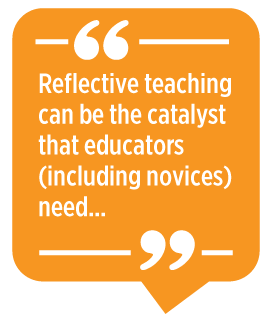
I have been thinking about reflective language teaching and what it means for the English language teacher. What is reflective practice, exactly? Dewey (1933) defined reflective practice as “active, persistent, and careful consideration of any belief or supposed form of knowledge in the light of the grounds that support it” (p. 16). In the teaching profession, reflection may stem from seeking a resolution to a thorny problem (Dewey, 1933) or a broader concern with routine practice (Farrell, 2022). Engaging in reflection on one’s practice is seen as a mark of professional competence across several fields (Farrell, 2020).
In the case of preservice teachers trying to make sense of all the phenomena they experience simultaneously as novice educators out in the field, reflecting on “routine” practice may be challenging in and of itself. They need time to become familiar enough with routines to distinguish between what is the norm and what is exceptional. Despite feelings of being overwhelmed, and the challenges of being frequently asked to “reflect” on a variety of topics in initial teacher education programs, requesting that they do so is valid. Schön (1987) believes that all educators—even ones new to the field—“know” more than they can articulate. For this reason, Farrell (2022) suggests prompting educators to reflect-in-action.

The European Centre for Modern Languages (Council of Europe, 2023) view an educator’s ability to draw on their “reflexive repertoire” to analyze a (thorny) issue or occurrence in their teaching as a necessary competence to develop. In fact, they view it as a key part of educators’ ability to identify and pursue professional learning that is relevant to their needs. Educators need to learn both (a) how to reorient their practice and (b) how to recognize when it is time to do so. Importantly, they need to develop the resourcefulness and resilience to face inevitable future challenges and changes (Farrell, 2020). As such, it is worth the time to invest in developing their competence for self-reflection and to expand their reflexive repertoire.
The European Centre for Modern Languages discusses one particular approach that involves developing the competences to gain the professional learning needed to adopt and develop pluralistic linguistic and cultural approaches to teaching in mainstream classrooms (Council of Europe, 2023). In this case, reflective teaching can be the catalyst that educators (including novices) need in order to focus on specific aspects of teaching, even if these educators understand the necessary changes only in broad, not formally articulated ways.
The extent of the change effected by adopting reflective teaching approaches may depend on an educator’s related experiences, experience in the profession, and how disparate their beliefs were initially in relation to the mindset required for certain practices to bear fruit. What is certain is that reflective teaching can serve as a major catalyst for educators’ understanding of thorny issues or broad questions about practice. It also goes hand in hand with engagement and can stimulate action, both of which can only benefit teachers and their learners.
References
Dewey, J. (1933). How we think: A restatement of the relation of reflective thinking to the educative process. Houghton-Mifflin.
Council of Europe. (2023). Developing teacher competences for pluralistic approaches. https://www.ecml.at/ECML-Programme/Programme2020-2023/Developingteachercompetencesforpluralisticapproaches/tabid/4300/language/en-GB/Default.aspx
Farrell, T. S. C. (2020). Professional development through reflective practice for English-medium instruction (EMI) teachers. International Journal of Bilingual Education and Bilingualism, 23(3), 277–286. https://doi.org/10.1080/13670050.2019.1612840
Farrell, T. S. C. (2022). Reflective practice in language teaching. Cambridge University Press. https://doi.org/10.1017/9781009028783
Schön, D. A. (1987). Educating the reflective practitioner. Jossey-Bass.
|
Download this article (PDF) |
Shelley Taylor is currently a professor at University of Western Ontario in Canada. Prior to her election as TESOL president (2023–2024), Taylor was a frequent presenter and contributor to English language teaching publications and scholarly research, and she was a TESOL board member from 2016–2019.
| Next Article |
